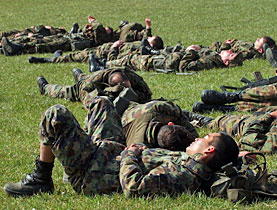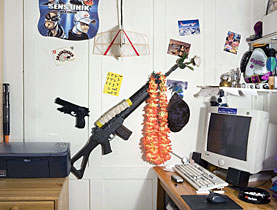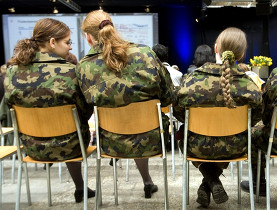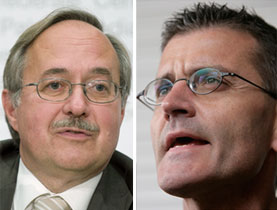Defence minister faces showdown in parliament

The role of Switzerland's armed forces is a key issue during the upcoming autumn session of parliament, which begins on Monday.
The credibility of embattled Defence Minister Samuel Schmid could be further undermined if the armament programme and further reform steps are rejected over the next three weeks.
Parliament is due to continue discussions on a SFr917 million ($812 million) credit to acquire armoured personnel carriers and other transport vehicles as well to maintain and update the technical equipment of the air force’s FA/18 fleet.
Heated debate is also expected about plans to make service with international peacekeeping troops or as technical experts mandatory for the militia army – non-professional soldiers who make up the bulk of the Swiss army.
There are presently about 250 Swiss soldiers and experts serving in mission abroad, including Kosovo.
As part of another reform, the government wants to enshrine in law the role of the army as backup for civilian security forces to protect foreign embassies and international conferences or other events, including the annual meeting of the World Economic Forum in Davos.
But more could be at stake, namely the job of the defence minister himself.
The controversial appointment of a new army chief commander, fatal accidents and other incidents have fuelled calls over the summer months for Schmid to step down.
Parliamentary decisions could now effectively precipitate his resignation.
“The worst case scenario for Schmid is if his opponents make approval of the armament programme conditional on his resignation,” says political scientist Georg Lutz of Lausanne University.
Opponents
Schmid faces a formidable alliance of opponents, notably the rightwing Swiss People’s Party and stalwart supporters of a traditional army plus critics on the centre-left of the political spectrum, including the Greens.
Lutz agrees that the fate of the defence minister is to some extent in the hands of the two centre-right parties, the Radicals and the Christian Democrats.
Under the Swiss constitution a minister cannot be forced out of office, if he loses a vote, but his position could nevertheless become untenable.
The ongoing public debate over the alleged identity crisis of the Swiss army is not surprising, according to Lutz.
“There is a lack of pragmatism in discussions on the army. Both the centre-left and the rightwing camp on their positions.”
Lutz adds that it is hard for outsiders to follow the internal debate within the army about the future of the institution, including the compulsory call-up system.
Identity crisis
For his part Schmid has brushed aside the notion of an identity crisis within the army.
“It’s a creation of diehard army opponents and those who can’t accept army reform,” he told the Neue Zürcher Zeitung newspaper.
Schmid has been backed by the retired chief commander of the armed forces, Christophe Keckeis. He blames frustrated opponents of reform, who “regret bygone times and insist on a traditional form of territorial defence”.
The army chiefs-of staff are apparently also examining the idea of cutting the size of the armed forces or reducing the scope of their mandate.
A former top defence ministry official, Hans-Ulrich Ernst, even mooted the idea of abandoning the conscript system, a tenet of Switzerland’s non-professional army.
“The army is too big. We have 140,000 soldiers active for ten years. This is not compatible with economic principles,” he said in several newspaper articles.
swissinfo, Urs Geiser

More
Militia army
Switzerland’s 220,000-strong armed forces, including reserves, function on a militia principle – not as a fully professional army.
Neutral Switzerland is not a member of Nato, but it joined its Partnership for Peace programme.
Defence Minister Schmid has been under fire for the appointment of a new chief of the armed forces last year. The commander had to step down over allegations of sexual harassment against a former girlfriend.
Schmid is also locked in a long-standing political row with the rightwing People’s Party. He joined a newly-founded rival group alongside the justice minister, Eveline Widmer-Schlumpf.
The House of Representatives is due to take on the armament programme. The Senate has already approved the SFr917-million credit package.
During the autumn session of parliaments, the House is also scheduled to debate a report on the role of the army.
The Senate will tackle plans to make military service with international peacekeeping troops mandatory – proposals rejected by a majority in the House.
Decisions need approval by both chambers, but no single party has a majority.

In compliance with the JTI standards
More: SWI swissinfo.ch certified by the Journalism Trust Initiative




You can find an overview of ongoing debates with our journalists here. Please join us!
If you want to start a conversation about a topic raised in this article or want to report factual errors, email us at english@swissinfo.ch.